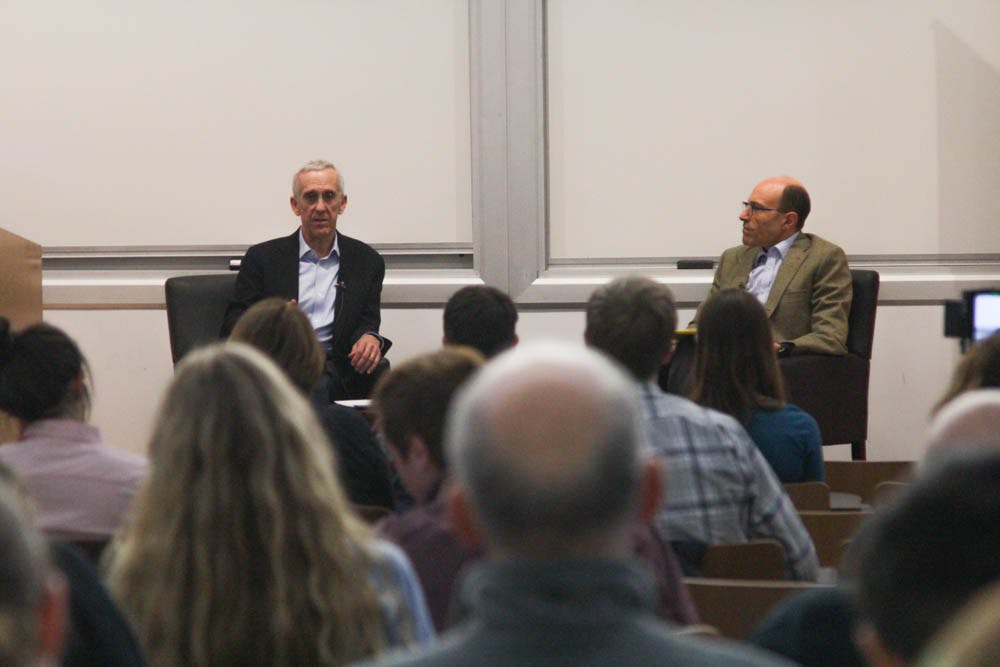“Don’t give up and don’t be resigned” in the fight against climate change, said Todd Stern, former U.S. Special Envoy for Climate Change in his Distinguished Speakers Series lecture Wednesday.
The fight against climate change should not be viewed as a burden but as an opportunity, Stern said, who led the U.S. negotiations at the Paris Climate Accords. “There is no question that the transformation to low-carbon technology is not just one of the biggest challenges, but (also) one of the biggest economic opportunities in front of us right now,” Stern said. “No country in the world has a comparative advantage in this area that’s bigger than the United States, because it’s all about innovation, and we have an innovation infrastructure and culture that is second to none.”
“From the point of view of somebody committed to action on climate change, the results of the election were unwelcome,” Stern said. But he added that the rapidly decreasing price of clean energy will continue under the Trump administration. “Despite this speed bump with respect to the Trump administrations policies” the shift to clean energy will continue, he told The Herald.
Stern discussed the implications of climate change as a partisan issue in the United States. With the election of Trump, “it’s clear domestically that there’s going to be a pullback” of climate-related action, he said. Despite this, around “75 percent of Trump’s supports are strongly in support of clean energy development.”
Globally, the treatment of climate change — with some notable exceptions in India and Middle Eastern states dependent on oil — is very different. “Mostly, climate change politically around the world is a post-partisan issue,” Stern said. China, for example, “has become quite invested in the development of renewable energy and clean energy,” and “is going pretty much full tilt” in trying to fulfill its commitment under the Paris Agreement, he added.
Stern also spoke about his career negotiating climate accords, beginning with the Kyoto Protocol in 1997. There, negotiators drafted an unrealistically ambitious plan that required ratification from the U.S. Senate, he said, but this approval never came. Today, the United States is the only signatory to the protocol that has not ratified it.
During the Bush administration, the United States stepped back from climate change response leadership. But Stern noted that after the 2007 UN Climate Change Conference in Bali, Indonesia, global leaders widely desired to draft a new agreement. Under the Obama administration, the United States jumped “onto a moving train of negotiations” that produced the Paris Agreement, Stern added.
Going into the negotiations, Stern said he knew that “we could not repeat the (Kyoto Protocol) experience of the United States saying ‘yes’ and then having it dead on arrival in the U.S. Senate.” He helped structure an agreement that did not have to be ratified by the Senate.
“This agreement is partly legally binding and partly not,” Stern said. For example, the targets for emissions reduction are not legally binding, but transparency and accountability requirements are.
The Paris Agreement “absolutely did not go far enough” because the targets it sets do not put the world on track to sufficiently stop rising temperatures. But “you can’t start unless you start,” he said.
Looking forward, Stern said that he is worried about the possible consequences of the French election on the European Union’s role in climate leadership. If France elects Marine Le Pen and leaves the EU, “it will be very challenging for the EU” to lead climate action, he added.
“In my experience in climate, there’s a lot of truth in” the notion that the United States is an “indispensable nation” in global leadership, Stern told The Herald. But while it seems that the Trump administration will shy away from leading the world in the fight against climate change, Stern said that the future of technology is unpredictable. Perhaps, in the near future, innovation will make it much easier to meet the targets of the Paris Agreement, he added.





